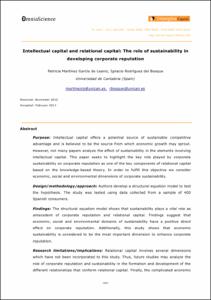Mostra el registre d'ítem simple
Intellectual capital and relational capital: The role of sustainability in developing corporate reputation
| dc.contributor.author | Martínez García de Leaniz, Patricia |
| dc.contributor.author | Rodríguez del Bosque, Ignacio |
| dc.date.accessioned | 2013-05-06T08:50:40Z |
| dc.date.available | 2013-05-06T08:50:40Z |
| dc.date.issued | 2013-04 |
| dc.identifier.citation | Martínez García de Leaniz, Patricia; Rodríguez del Bosque, Ignacio. Intellectual capital and relational capital: The role of sustainability in developing corporate reputation. "Intangible capital", Abril 2013, vol. 9, núm. 1, p. 262-280. |
| dc.identifier.issn | 1697-9818 |
| dc.identifier.uri | http://hdl.handle.net/2099/13281 |
| dc.description.abstract | Purpose: Intellectual capital offers a potential source of sustainable competitive advantage and is believed to be the source from which economic growth may sprout. However, not many papers analyze the effect of sustainability in the elements involving intellectual capital. This paper seeks to highlight the key role played by corporate sustainability on corporate reputation as one of the key components of relational capital based on the knowledge-based theory. Design/methodology/approach: Authors develop a structural equation model to test the hypothesis. The study was tested using data collected from a sample of 400 Spanish consumers. Findings: The structural equation model shows that sustainability plays a vital role as antecedent of corporate reputation and relational capital. Findings suggest that economic, social and environmental domains of sustainability have a positive direct effect on corporate reputation. Additionally, this study shows that economic sustainability is considered to be the most important dimension to enhance corporate reputation. Research limitations/implications: The complicated economic environment currently experienced worldwide may affect the perceptions of Spanish consumers and their ratings. The crosscutting nature of this research inhibits an understanding of the variations in the perceptions of the customers surveyed over time, suggesting that this research could be expanded by a longitudinal study. Finally, the current study has been conducted with consumers of hotel companies in Spain and it is not clear in how far the findings can be generalized to other industries, stakeholders or countries. Practical implications: This research allows managers to identify the activities in which companies can devote resources to in order to increase firm´s reputation. By knowing these specific economic, social and environmental activities, companies can understand, analyze and make decisions in a better way about its sector and about the stakeholders that assess these initiatives. Originality/value: To our knowledge, in any case it has been studied simultaneously the influence of sustainability dimensions on corporate reputation, which is a knowledge gap in the academic literature. |
| dc.format.extent | 19 p. |
| dc.language.iso | eng |
| dc.publisher | Intangible Capital |
| dc.rights | Attribution-NonCommercial 3.0 Spain |
| dc.rights.uri | http://creativecommons.org/licenses/by-nc/3.0/es/ |
| dc.subject | Àrees temàtiques de la UPC::Economia i organització d'empreses::Gestió i direcció::Recursos humans |
| dc.subject.lcsh | Corporate image |
| dc.subject.other | Intellectual capital |
| dc.subject.other | Relational capital |
| dc.subject.other | Sustainability |
| dc.subject.other | Corporate reputation |
| dc.subject.other | Reputació corporativa |
| dc.subject.other | Capital relacional |
| dc.subject.other | Capital intel·lectual |
| dc.title | Intellectual capital and relational capital: The role of sustainability in developing corporate reputation |
| dc.type | Article |
| dc.subject.lemac | Imatge corporativa |
| dc.identifier.dl | B-33375-2004 |
| dc.description.peerreviewed | Peer Reviewed |
| dc.rights.access | Open Access |
| local.citation.author | Martínez García de Leaniz, Patricia; Rodríguez del Bosque, Ignacio |
| local.citation.publicationName | Intangible capital |
| local.citation.volume | 9 |
| local.citation.number | 1 |
| local.citation.startingPage | 262 |
| local.citation.endingPage | 280 |
Fitxers d'aquest items
Aquest ítem apareix a les col·leccions següents
-
2013. vol. 9, núm. 1 [15]


